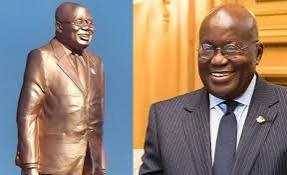President Akufo-Addo unveiled statue of himself at Effia Nkwanta Hospital
In a symbolic gesture aimed at honoring his contributions to healthcare and infrastructure, President Nana Addo Dankwa Akufo-Addo recently unveiled a statue of himself at the Effia Nkwanta Regional Hospital in the Western Region of Ghana. This unveiling ceremony, attended by government officials, healthcare professionals, and local leaders, sparked significant attention and discussion nationwide. The statue’s inauguration was part of a broader visit to the hospital, aimed at highlighting recent government investments in the country’s healthcare sector and celebrating the strides made under his administration.
Effia Nkwanta Regional Hospital, one of Ghana's key healthcare facilities, has a longstanding history of serving communities in the Western Region and beyond. Over the years, the hospital has faced various challenges, including limited infrastructure and insufficient medical resources, that have hindered its ability to deliver optimal healthcare. However, the recent government interventions have aimed to modernize the facility and address some of its pressing issues.
In his address at the unveiling ceremony, President Akufo-Addo underscored his government’s commitment to improving healthcare access and quality across Ghana. He highlighted the various initiatives his administration has undertaken, such as the Agenda 111 project, which aims to construct and refurbish hospitals and health centers throughout the country. Akufo-Addo emphasized that the healthcare sector has always been a priority, particularly following the COVID-19 pandemic, which highlighted the critical need for a robust healthcare infrastructure in Ghana.
“Ensuring that Ghanaians have access to quality healthcare is a responsibility my government has taken seriously,†Akufo-Addo stated. “We have made unprecedented investments in this sector, and I am proud to see the tangible results here at Effia Nkwanta.â€
The statue, depicting Akufo-Addo standing in a posture symbolic of leadership and dedication, serves as a tribute to his administration's efforts in bolstering Ghana’s healthcare infrastructure. Local authorities and hospital officials expressed gratitude for the initiatives under Akufo-Addo’s government, which have included renovation and expansion projects aimed at enhancing the hospital’s capacity to serve the growing population of the Western Region. The facility's officials noted that these developments would go a long way toward addressing the health challenges facing the region.
Despite the praise for his contributions, the unveiling of the statue also drew criticism from some segments of the Ghanaian public and political opponents. Detractors argue that self-commemorative gestures are premature and should be reserved for leaders posthumously or at least after they have left office. Critics contend that focusing on statues may divert attention from more pressing healthcare needs, such as staffing shortages, medical equipment, and resources. The conversation on social media reflected a mix of admiration for Akufo-Addo’s achievements and criticism over the symbolism of the statue.
A member of the opposition National Democratic Congress (NDC) commented that while Akufo-Addo’s contributions to healthcare were acknowledged, the statue could be perceived as an unnecessary display of self-praise. Others argued that resources spent on such gestures could be better allocated to improving hospital facilities directly.
In response to such criticisms, supporters of the president argued that the statue serves as an inspiration for future generations, emphasizing the importance of leaders taking bold steps toward national development. Some local community members expressed pride in the statue, viewing it as a symbol of the progress achieved in recent years under Akufo-Addo’s leadership.
The unveiling at Effia Nkwanta Hospital reflects a larger trend in Ghana of commemorating leaders through statues and monuments, a practice intended to inspire citizens and instill national pride. While opinions on the appropriateness of the statue may vary, it has undeniably spotlighted the government’s investments in healthcare. The conversation surrounding the event also highlights the challenges of balancing national development initiatives with public perception and expectations.
As the Akufo-Addo administration continues to push for improvements in healthcare and other sectors, the statue at Effia Nkwanta will likely remain a symbol of his tenure and his commitment to health infrastructure. For supporters, it represents a legacy of action and progress; for critics, it invites reflection on how leaders can best be commemorated. Regardless of perspective, the unveiling has underscored the impact of Akufo-Addo’s healthcare policies and initiated a dialogue on legacy and leadership in Ghana.




No comments yet
Be the first to share your thoughts!